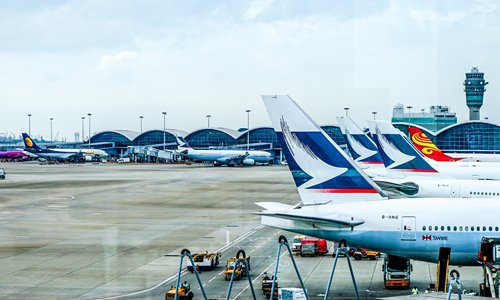
Aircraft at the Hong Kong International Airport File photo: IC
At the ongoing two sessions, several Hong Kong-based political advisors have proposed setting up what's known as co-location joint checkpoint arrangement at the Hong Kong International Airport, a move that is expected to enable the opening of more air routes between Hong Kong and mainland cities and help boost Hong Kong's economy.
The co-location arrangement for joint checkpoint would make it much more convenient for mainland visitors to travel to Hong Kong with a significant increase of mainland destinations, Wong Cho-bau, a member of the Chinese People's Political Consultative Conference (CPPCC) National Committee and chairman of Shenzhen-based Donghai Airlines, told the Global Times when elaborating on the proposal.
This would necessarily bring mainland customers in larger numbers than during the pre-pandemic period for Hong Kong, while saving the city's tourism and dining industries from falling, he said.
The proposal was submitted jointly by Henry Tang Ying-yen and Liu Changle, both members of the Standing Committee of the CPPCC National Committee, and Wong.
Currently, the Hong Kong airport only has direct flights to 37 mainland cities, according to Wong. This has largely impeded Hong Kong airports' initiative to integrate into the development of the mainland's civil aviation sector, while restricting Hong Kong's ability to play its role as a super link point between the mainland and global markets, officials said.
After setting up a co-location arrangement, mainland checkpoints will be set up at the Hong Kong airport. Any mainland airports can open direct flights with Hong Kong, which will enable the Hong Kong airport to connect to the whole aviation network in the mainland.
Co-location has already been implemented in five ports in China, including one in the West Kowloon Station of the Hong Kong Section of the Guangzhou-Shenzhen-Hong Kong Express Rail Link.
Wong said he looks forward to multiple benefits from this move. Apart from enhancing clearance efficiency between the mainland and Hong Kong, the move is also expected to stimulate personnel exchanges and economic interactions between Hong Kong and the mainland, he said.
"If co-location is implemented in the Hong Kong International Airport, easy access to the city is available for all mainland residents, which will generate unprecedented business opportunities (for Hong Kong)," Wong noted.
This is especially meaningful for the city, as Hong Kong's economy has been severely battered after multiple challenges, including unrest in 2019 and the pandemic. In 2021, only 1.4 million trips were made via the Hong Kong International Airport, less than 2 percent of the 2019 level.
According to Wong, Hong Kong plans to initiate the co-location arrangement in 2022 and implement it in 2025.




